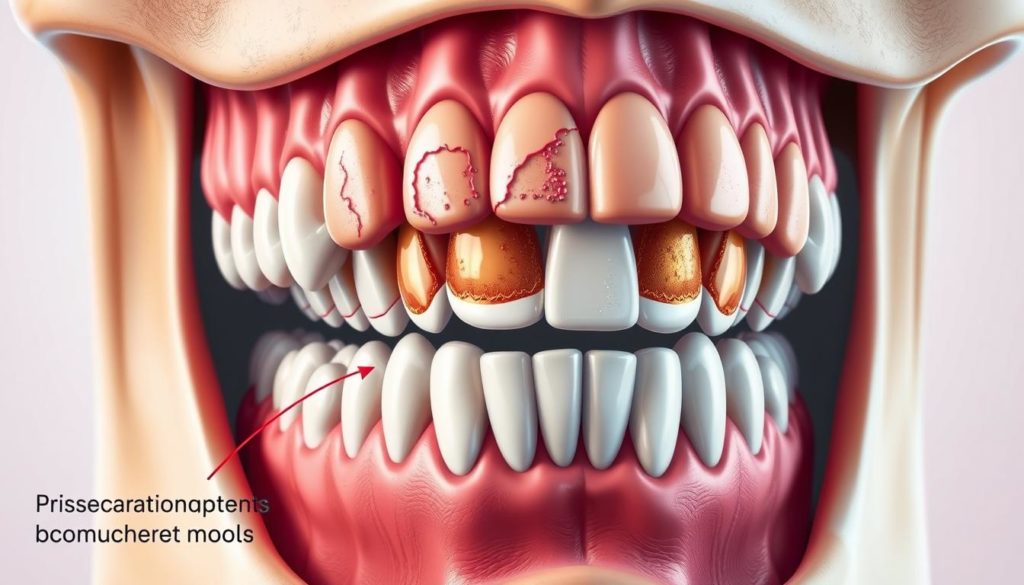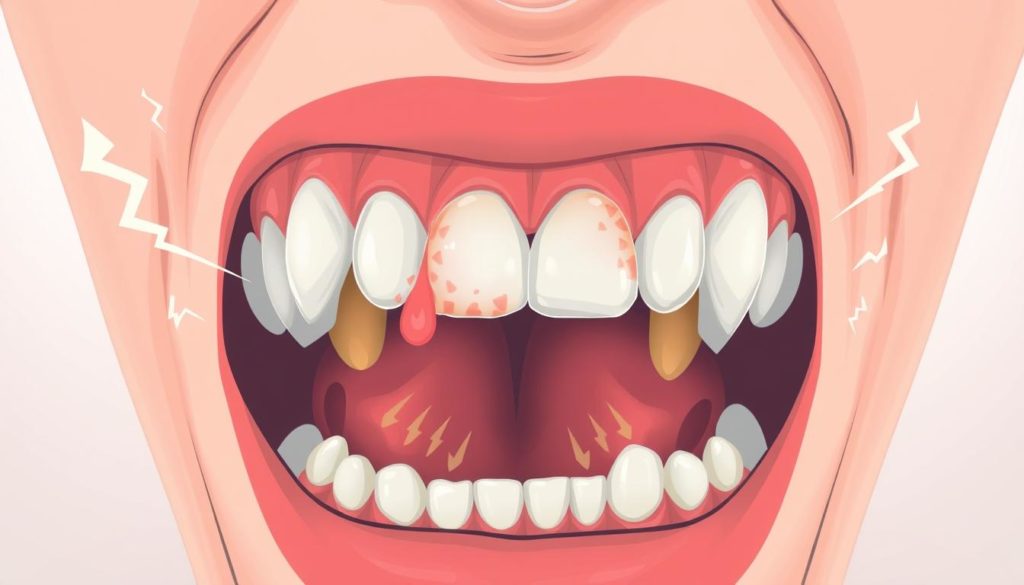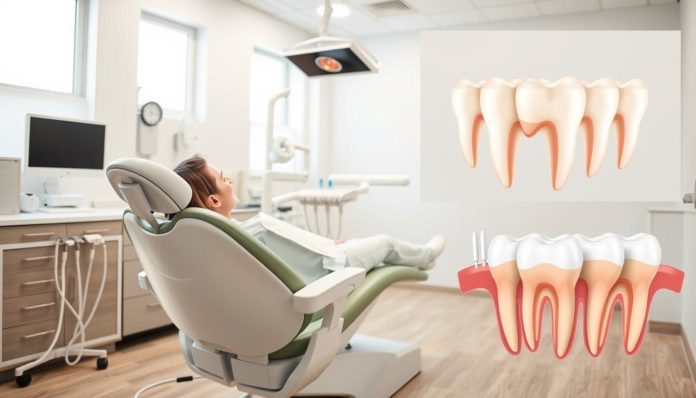Did you know that about 5 million Americans get their wisdom teeth removed each year? This shows how big of a deal wisdom teeth are for our teeth.
Wisdom teeth, or third molars, usually come in when you’re in your late teens or early twenties. Some people don’t have any problems, but many need them taken out because of issues.
It’s important to know about the wisdom teeth removal process. This helps keep your teeth healthy and prevents future problems. We’ll cover everything from why you might need it to how to get ready for the surgery.
Find out about the common problems caused by impacted wisdom teeth. Learn how to tell if you need them removed and how to make the process and recovery easier. Keep reading to learn more and get tips for taking care of your teeth.
Why Do Wisdom Teeth Need to Be Removed?
Wisdom teeth, also known as third molars, come in during late teens or early twenties. It’s key to know why they’re removed to keep our mouths healthy.
The Purpose of Wisdom Teeth
Long ago, wisdom teeth helped our ancestors chew tough foods. But, as our diets changed, our jaws didn’t grow enough for these extra molars. This often causes them to get stuck, making it hard for them to come in right.
Common Problems Caused by Wisdom Teeth
Today, wisdom teeth can cause many dental issues. They can push other teeth out of line. Also, if they get stuck, they can trap food and bacteria, leading to infections.

Many reasons for tooth removal are linked to wisdom teeth problems. Issues like constant pain and cysts can happen. Knowing this shows why it’s crucial to remove them early to avoid more dental troubles.
Signs You Need Wisdom Teeth Extracted
Knowing when to get your wisdom teeth removed is key to avoiding big problems. It’s important to watch for signs like *dental pain* and other *wisdom teeth symptoms*. Here are some key signs that might mean you need an extraction.

Pain and Discomfort
*Jaw discomfort* and *dental pain* are big warning signs. These pains happen when your wisdom teeth put too much pressure on your mouth. If you keep feeling pain, especially in the back of your mouth, see an *oral surgeon*.
Swelling and Inflammation
But *wisdom teeth symptoms* don’t stop at *dental pain*. Swelling and inflammation in your gums are also red flags. Your gums might feel sore and could even get infected. If you see your gums swelling or find it hard to open your mouth, get help fast.
Preparing for Wisdom Teeth Removal
Getting ready for wisdom teeth removal is crucial. By following these steps, you’ll make the process easier.
Consulting with Your Dentist
The first step is a dental consultation. Your dentist will take X-rays and look at your dental history. They will decide the best plan for you.
Pre-Surgery Instructions
After your dental consultation, you’ll get specific instructions:
- Fasting Guidelines: You might need to fast for a few hours before, based on the anesthesia.
- Post-Operative Care: Make sure someone can drive you home and help you after the surgery.
- What to Bring: Bring your ID, insurance, and any needed medications on surgery day.
By following these steps, you’ll have a better wisdom teeth removal experience.
The Wisdom Teeth Removal Procedure
Removing wisdom teeth is a dental surgery process with key steps for comfort and success. First, the dentist will talk about anesthetic options to find the best one for you. You might get local anesthesia, sedation, or general anesthesia, based on your needs and the tooth’s complexity.
After the anesthesia kicks in, the extraction procedure starts. If your wisdom teeth are partly or fully out, the dentist will use special tools to loosen them. For impacted tooth removal, a small cut in the gum might be needed. This allows access to the tooth, sometimes requiring bone removal. The impacted tooth is then taken out in parts to protect the surrounding tissues.
Here’s what you can expect:
- Numbing the area with anesthetic options
- Accessing the tooth, possibly through a gum incision
- Removing any bone blocking the tooth root
- Extracting the tooth, often in pieces for impacted cases
- Cleaning the extraction site
- Stitching the incision to promote healing
During the dental surgery, the dental team keeps a close eye on your comfort and health. After the extraction procedure, you’ll get care instructions to help with healing and prevent problems.
What to Expect During Oral Surgery
Oral surgery can seem scary, but knowing what to expect can help. From the start, the dental team focuses on your comfort. They use dental anesthesia to keep you pain-free during the surgery.
Before starting, the team reviews the surgery plan. This step is key for a successful surgery. You might feel some pressure, but thanks to the anesthesia, you won’t feel pain.
Patients often worry about the surgery’s length and what they’ll feel. The surgery’s length depends on the complexity of the techniques used. The dental team is skilled and will keep you updated and comfortable.
After the surgery, you’ll get instructions for caring for yourself. Following these steps is important for a smooth recovery. It helps reduce pain and speeds up your healing.
Recovery Tips for a Smooth Healing Process
After getting your wisdom teeth removed, taking good care of yourself is key. Here are some tips to help you manage pain, follow dietary rules, and know when to rest. These tips will help your body heal well.
Pain Management
Managing pain is a big part of getting better. Your dentist will tell you how to handle pain. This might include taking medicine or using ice packs to reduce swelling and pain.
Dietary Guidelines
It’s important to eat the right foods to heal. For a few days, stick to soft foods like yogurt, applesauce, and mashed potatoes. Stay away from hot, spicy, or hard foods that could hurt the area. Slowly add back solid foods as you can.
Activity Restrictions
Limiting certain activities helps your body heal faster. Avoid heavy lifting or intense workouts for a week. Also, keep your head up, don’t smoke, and avoid using straws to prevent bleeding.
By following these tips and focusing on pain relief, you can make your recovery easier. This will help you heal quickly and smoothly.
Potential Complications from Wisdom Teeth Removal
Wisdom teeth removal is common, but knowing about possible problems is key. Understanding these issues helps patients recover smoothly. Main concerns include dry socket and infections.
Dry Socket
Dry socket is a big problem after tooth removal. It happens when the blood clot goes away too soon. To avoid it, follow your dentist’s advice carefully. This means no straws, smoking, or hard rinsing.
Pain, an empty socket, and seeing bone are signs of dry socket. It’s important to watch for these symptoms.
Infections
Infections are a serious risk after oral surgery. Spotting symptoms early is vital. Look out for swelling, redness, bad taste or smell, and fever.
Sticking to antibiotics and keeping your mouth clean helps a lot. If you notice any signs, tell your dentist right away. They can help you get better.
Cost Considerations for Wisdom Teeth Extraction
The cost of removing wisdom teeth can be a big worry for many. It’s key to know what affects the price to plan your budget well. Things like how hard the extraction is and the type of anesthesia used can change the cost.
Factors Affecting the Cost
Several things can change the price of wisdom teeth removal. If your teeth are impacted or need surgery, it will cost more. The type of anesthesia used also matters. Plus, where you live can affect the price too, as costs vary by region.
Insurance Coverage
Dental insurance can help with the cost of removing wisdom teeth. Many plans cover part of the cost, but how much varies. It’s smart to talk to your insurance to know what they’ll pay and what you’ll have to pay yourself. Discussing costs and insurance with your dentist can prevent surprises.
FAQ
What is the process for wisdom teeth extraction?
Wisdom teeth extraction is a surgical procedure. It removes one or more of the four adult teeth at the back of your mouth. An oral surgeon performs it, using local, sedation, or general anesthesia. The goal is to prevent dental problems and ensure better oral health.
Why do wisdom teeth need to be removed?
Wisdom teeth often need removal due to issues like impaction, crowding, infection, or gum disease. They can cause hygiene problems and damage nearby teeth. Removing them improves dental care and prevents future issues.
What are the common problems caused by wisdom teeth?
Common problems include tooth impaction, causing pain, infection, and misalignment. Other issues are cysts, damage to adjacent teeth, and hygiene difficulties.
What are the signs that you need wisdom teeth extracted?
Signs include persistent pain, swelling, inflammation, and jaw discomfort. If you have these symptoms, see an oral surgeon soon.
How should I prepare for wisdom teeth removal?
Preparation involves consulting your dentist, getting X-rays, and following pre-surgery instructions. This includes fasting and arranging for post-operative care. Proper preparation ensures a smooth procedure and recovery.
What happens during the wisdom teeth removal procedure?
The procedure involves making an incision in the gum and removing any bone blocking access. Then, the wisdom teeth are extracted. Anesthesia is used to manage pain and discomfort.
What can I expect during oral surgery?
During surgery, anesthesia keeps you pain-free. The procedure lasts between 45 minutes to an hour. Your dental team ensures your comfort and explains each step.
What are some recovery tips for a smooth healing process?
Post-surgery, manage pain with prescribed medication and follow dietary guidelines. Eat soft foods and restrict physical activities. Keeping your head elevated and using ice packs can reduce swelling.
What are the potential complications from wisdom teeth removal?
Complications include dry socket, infections, and prolonged bleeding. Following your dentist’s post-operative instructions can minimize these risks and ensure a smoother recovery.
What factors affect the cost of wisdom teeth extraction?
Factors include the complexity of the extraction, type of anesthesia used, and the number of teeth removed. Check with your dental insurance to understand your coverage and any out-of-pocket expenses.


